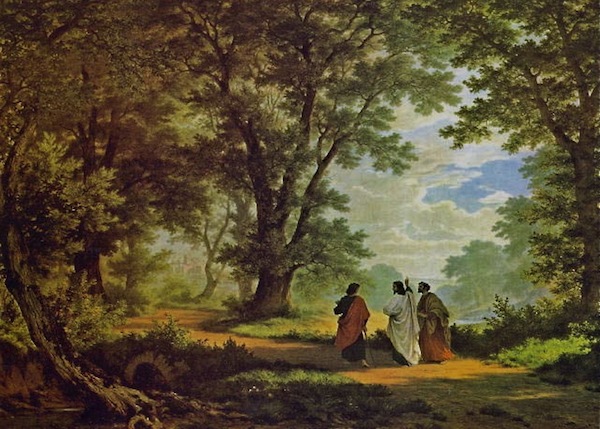Acts 2:14, 22-23
Psalm 16
I Peter 1:17-21
Luke 24:13-35
In the late 17th and early 18th centuries, there erupted a localized but fierce dispute among mathematicians and scientists about who was primarily responsible for the invention of what we know today as Calculus. Some claimed that Isaac Newton was the first to develop and employ it, while others insisted that it was Gottfried Leibniz who made the initial discovery of the method. There are some, however, who argue that the two came to the same monumental breakthrough more or less simultaneously. While it is extremely difficult to determine with any certitude who was the first to make the crucial insights necessary for the method, it is almost impossible to assign any relative responsibility to each thinker because the historical record indicates that the two worked entirely independently of one another. There is no record of any personal meeting between the two, and very scant evidence that either knew much at all about the kind of work the other was doing. Yet a controversy such as this one nevertheless remains possible because of the nature of the subject in dispute. In principle, the two could have come to the same discovery at the same time even in isolation from one another, since the discovery was one that did not depend upon personal contact or historical testimony. Such is the nature of advances in the purely conceptual realm.
The breakthrough of Easter, however, is of an entirely different nature. Though its implications apply to all humanity, and indeed to the entire cosmos, its comprehension nevertheless depends upon the communication of particular events that happened at particular places and times. Like all monumental breakthroughs in human knowledge, the good news of the Gospel changes the way one sees everything else in the world. But this paradigm-shifting advance is not limited to the realm of knowledge alone. It aims to reorient all of human life—past, present and future—down to the most specific of human relationships. It must therefore enter the realm of human history, where events and relations unfold slowly and successively, and in a concrete context.
That God assumed our nature in its entirety and gave his life for our salvation is not an insight that one could arrive at apart from such a context. The Gospel must therefore be mediated by such a context—a context about which one cannot know unless one is told. Despite all the intriguing questions raised by the story of the Magi, a full apprehension of the Gospel is not something that the sages of India or the oracles of Greece could have come to independently, without any direct interaction with witnesses of the Jesus event. In order to understand this event, one needs some basic knowledge about the broader context which makes Jesus’ life and work intelligible.
And so in the first reading for this Sunday, we find Peter and the other apostles telling the story of Jesus’ resurrection in a way that is inextricably couched inthe context of Jewish history, both recent and ancient. We hear Peter mention the words Jews, Jerusalem, Israelites, Nazarene, David and Christ. These are words that belong to the story of a particular people’s history and the broader worldview that emerges from that history. Peter presents himself not only as the narrator of this history to his fellow Jews, but more importantly as a witness its defining event , an event that casts this history in a new light and unlocks a new horizon in the worldview proceeding from it.
As the missionary activity of the early Church makes clear, the apostles believe this event opens up these new horizons to all humanity. Thus they act on the conviction that the story through which the intelligibility of this event comes to light is potentially everyone’s story. To the extent that mortality and corruption apply to all human beings, this message bears saving significance, but nevertheless the vehicle of that saving significance always remains the story of Israel.
And so we hear the resurrected Jesus himself coming to two of his baffled and fearful disciples on the road to Emmaus. Their problem is one of vision, of apprehension of the meaning of the events that have just transpired. And on one level, that apprehension is intellectual: it requires a synthesis of the various aspects of Israel’s history and scriptures of which they are at that moment incapable.
Yet it is not only an intellectual problem with which they are faced; for if it were, we could imagine them devoting themselves to continuous study from that point, slowly chipping away at the various texts until they came up with a theological framework in which everything “fit.” But there would be something deeply incongruous about that, of course, almost satirical. For that would empty the theological endeavor of its animating center: personal contact with the Risen Lord. And by extension, it would also suggest that such personal contact is not necessarily a requirement for the ongoing transmission of the Gospel.
The preaching of the Christ’s resurrection is nothing if it is not accompanied by “the promise of the Spirit” and “the burning of the heart” which we hear about in today’s readings. It is by these descriptions that the scriptures point us to two concurrent and equally necessary dimensions of an individual’s apprehension of the Gospel: (1) the recognition of the way in which the Paschal mystery fulfills and perfects the Law and prophets of Israel, and (2) the recognition of Christ’s personal presence in our midst, both in “the breaking of the bread” and in “the stranger on the road.”
While the first of these is necessary to a certain extent, it is the second which represents the ultimate source and goal of the Christian life. We need the scriptures to understand the story within which God has chosen to save us. But it is God himself we are really after; it is God himself for which our hearts were made. And as Jesus himself has promised us in those scriptures, we can find him in two principal places: at the altar in the Eucharist, and in the streets among the poor.



